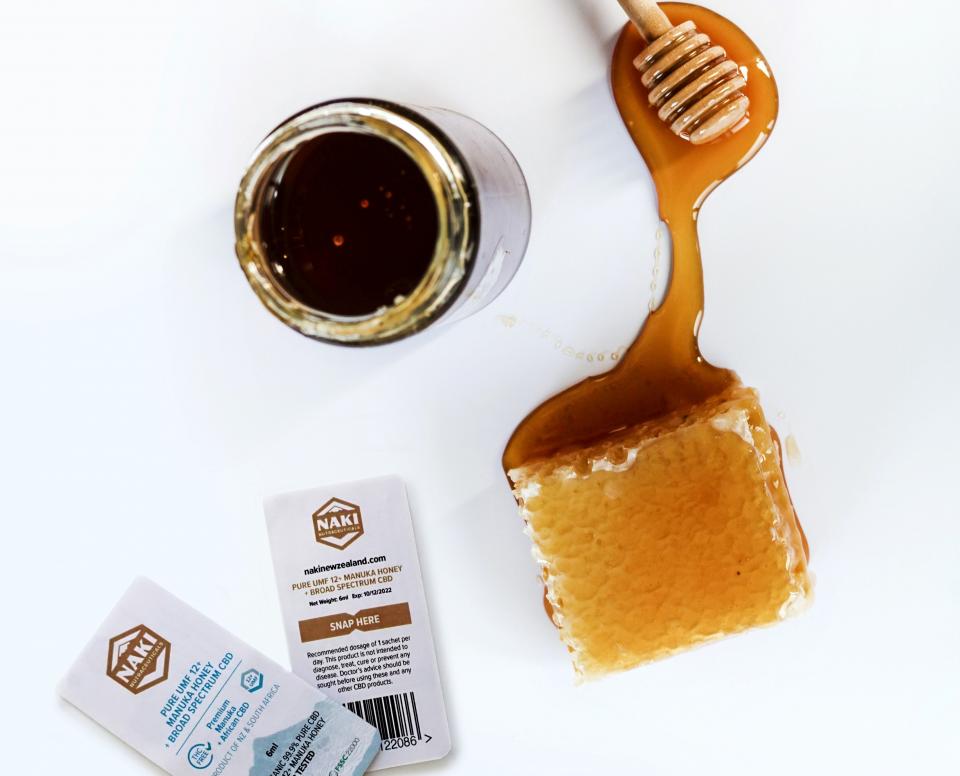Taranaki-based honey brand Naki New Zealand has developed a manuka honey and CBD blended nutraceutical to target the billion-dollar export market for cannabidiol (CBD) edibles.
Cannabidiol is a substance found in cannabis that has potential therapeutic value and little-to-no psychoactive properties. In New Zealand, CBD products are prescription-only medicines. Proponents of CBD edibles say they can assist with alleviating a wide range of conditions including anxiety, pain, insomnia and inflammation.
Taranaki based honey brand Naki New Zealand will launch a new single-serve Manuka honey product blended with a CBD extract. The company has existing interest from the product in six of their key US and European markets they already have a presence in.
The global market for CBD infused edibles is set to grow by 25 percent annually over the next seven years and is estimated to be worth over $8bn in Europe alone. Naki NZ global market manager Derek Burchell-Burger (pictured below) says there are distinct differences in New Zealand’s Manuka honey export markets. “For the Chinese, Manuka honey is among the most expensive kinds of honey and it carries a premium mainly for the social status associated with it. The European market is noticeably different, in countries like Germany, Austria, Netherlands and Sweden the product is more likely to be sold through a naturopathic practitioner channel.
“They are highly educated about the medicinal qualities of Manuka honey and recognise it as an effective transport system for nutrients as the honey sugars enter directly into the bloodstream and they are asking very detailed questions about the antibacterial methylglyoxal levels, anti-viral, even immunopotentiating abilities and of course the UMF grade is very important.”
“In contrast to the Chinese market, the Europeans are looking for the more efficacious higher grade of honey,” he says.
Burchell-Burger says their European distribution model differs from other parts of the world. “We will send shipping containers of honey to Asia and this is on-sold by distributors throughout China, South Korea and Japan. This Asian market model is more effective for us as they have established distribution networks, speak the lingo and can engage local celebrities and influencers to endorse our products.
“In Europe and the US we are much more hands-on at a retail level and will have one-on-one conversations with pharmacies, supermarkets and wellness outlets."
He says the new Naki Honey Manuka CBD blend will be available as a single-serve, snap pack product and at $5.50-6.00 will cost around the same as a takeaway coffee. “The snap pack format is more familiar for its use in sauces but we believe it will work effectively for a convenient, on-the-go wellness product as well.
“One of the big factors hampering the growth of CBD edibles is the relatively high cost. If we were to package this is a tub the same size as our other Manuka honey products, the price could be upwards of $40 - which is too high to achieve any volumes and will deter spontaneous purchase. The single-serve format will allow us to have a more palatable retail price point for consumers and reduce price as a barrier to trial,” he says.
Burchell-Burger says they have faced a number of challenges which have hampered the development of the new product. The current travel restrictions have meant they have been unable to taste the product themselves.
“The current regulatory environment in New Zealand is not conducive to the development of CBD edibles and so to bring this product to market more rapidly we have had to ship our honey offshore to South Africa where it has been blended with a broad spectrum CBD extract. At the same time we haven’t been able to import a sample nor travel overseas to the manufacturers and so we have used specialists in that market to refine the taste,” he says.
Burchell-Burger says the restrictions in this market have reduced New Zealand’s potential export earnings. He says this is the first time the New Zealand family owned Naki Honey has not produced a honey product locally but was a necessary move in order to their expedite entry to market.
“The tight regulatory environment around CBD development in New Zealand has meant we are coming in quite late to the party. If we were able to import CBD more easily into New Zealand, we would be able to manufacture the finished product here and export directly to our customers, instead of shipping honey offshore to create the finished product in another market.
“This means we are somewhat removed from the usual oversight we have in the packaging of our honey. At the same time, the level of expertise in offshore markets like South Africa in developing CBD edibles is significantly further ahead than New Zealand which meant we could find a scientist already well versed in the emulsification process of CBD and honey and this provided a considerable shortcut to enter production.
“Regardless of the outcome of the referendum there is a huge export opportunity for the development of other CBD edibles blended with flavours and foods local to this country,” he says.



